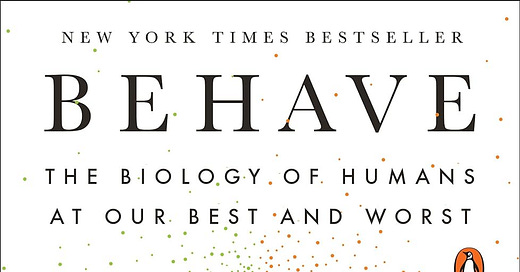Welcome to the latest issue of Book Freak! I’m your guide to the world of books about people and what makes them tick. This time, we’re looking at Behave: The Biology of Humans at Our Best and Worst, by Robert M. Sapolsky, which explores the biological factors that influence human behavior, with a focus on explaining the roots of violence, aggression, and competition as well as cooperation, empathy, and altruism.
Drawing from neurobiology, endocrinology, genetics, developmental psychology, ecology, and evolutionary theory, it examines how our primate roots blend with uniquely human capacities. Throughout, Sapolsky weaves personal reflections as he probes optimistically for biology's insights into our greatest human challenges.
Sapolsky has a newer book, called Determined: A Science of Life without Free Will, but I’m too scared to read it. I’m already iffy on the idea of free will, and I fear that if I read it, it will push me fully into the determinism camp!
Here are some useful pieces of advice from Behave:
Cultivate understanding and empathy. Sapolsky emphasizes how our brains are wired to relate to others' experiences neurologically. Actively trying to understand others' perspectives and struggles can foster more meaningful connections.
Question dichotomies. The book argues against viewing human behaviors as simply "good" or "evil," but rather arising from the same underlying biology utilized in different contexts. Avoiding overly dualistic thinking can bring more nuance.
Be aware of biological influences. While not excusing misdeeds, recognizing how factors like brain development, hormones, and evolutionary roots shape our predispositions can promote self-awareness.
Find the upside of being human. Our complex biology allows the highest forms of empathy, creativity, and collaboration. Appreciate and develop these uniquely human capacities.
Promote environmental enrichment. Sapolsky highlights how childhood experience shapes brain development. Creating enriching environments, especially for the young, can positively impact lives.
Maintain a critical optimism. Despite a biological inheritance tied to violence and tribalism, Sapolsky advocates hope that understanding can overcome negativity. Pragmatic optimism motivates positive change.
Quote: “Why does religion arise? Because it makes in-groups more cooperative and viable (stay tuned for more in the next chapter). Because humans need personification and to see agency and causality when facing the unknown. Or maybe inventing deities is an emergent by-product of the architecture of our social brains.”
That’s it for this issue. Please share your thoughts in the comments. Book Freak is a free newsletter, but if you subscribe (or buy a cheap classified ad!), you will help Claudia, Kevin, and I keep making newsletters. Thanks for reading!
Unclassifieds
Buy a Book Freak Unclassified ad for $50 and reach over 12,400 readers!
I use a fantastic app called Reader, the first read-it-later / newsletter / RSS-reading / web-highlighting app for power readers. Save everything to one place, highlight like a pro, and replace several apps with Reader. Book Freak readers can try it free for 60 days.
The Magnet is Book Freak editor Mark Frauenfelder’s newsletter of curiosities across space and time. Subscribe here.
Setapp is a hand-picked collection of quality software, packed with prime apps. There’s no store — just a folder on the Mac, and no hidden costs — just a flat monthly fee. It’s simple, and users love it. Try it here!
Book Freak is published by Cool Tools Lab, a small company of three people. We run the Cool Tools website, a video reviews YouTube channel, and other newsletters, including Gar’s Tips & Tools, What’s in my NOW?, and Recomendo. You can support our work by becoming a patron via Patreon.



